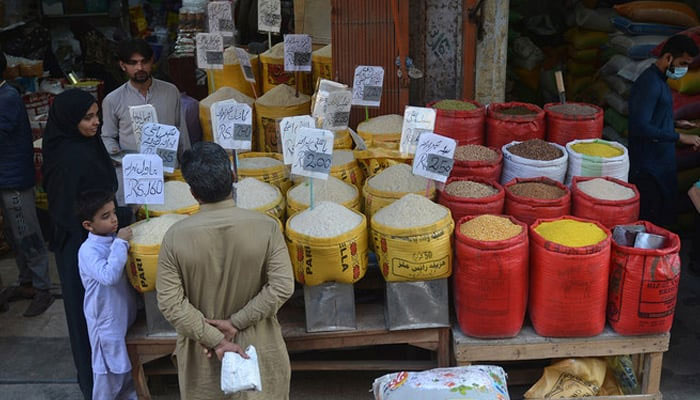‘Country’s economy to grow at 2.3pc this year’
LAHORE: Pakistan’s economy will grow at a rate of 2.3 percent in FY 2024 while the low growth and high inflation will significantly increase poverty this year and in the coming years.
This was established by the economists Dr Moazam Mahmood, Seemab Sajjid and Amna Noor Fatima in presentation of their research here on the first phase of the annual conference on ‘Management of the Pakistan Economy’ organised by a private university. They showed that approximately 10 percent of taxes would have to be spent on transfers to lower income households to eliminate this poverty and that this would become larger over the coming years which implies that there must be a significant increase in transfers to households this year, through programmes like the Benazir Income Support Programme) and in the coming years to address poverty in Pakistan. Pakistan’s economy was projected to grow at 2.3 percent over FY2024.
Earlier, LSE Rector, Dr Shahid Amjad Chaudhry, opened the conference, by highlighting key policy messages that emerged from the 17 papers being presented. Dr Naved Hamid of the Lahore School of Economics and Dr Murtaza Syed of the Asian Infrastructure Investment Bank discussed how high interest rates are necessary to combat inflation. They addressed common arguments against and said that even if inflation was a result of supply-side factors and if government borrowing was relatively less responsive to high interest rates, one of the most important ways to curtail inflation is still through interest rates. They also discussed that interest rate changes would be critically influenced by the amount of the fiscal deficit and the level of international commodity prices.
Dr Rashid Amjad and Almazia Shahzad discussed how the stop-go cycle of economic growth in Pakistan is caused by unsustainable fiscal deficits coupled with foreign borrowing. They proposed that the only way to achieve growth and stability in Pakistan was to reverse the role of the federal and provincial governments. The federal government should concentrate on meeting the external financing gap, accelerate economic reforms and manage the fiscal deficit while the provinces should engine for growth and job generation. He said that the provinces to incorporate growth and job generation targets into their annual development plans and also engage in private public partnerships to increase productivity and growth. Dr Azam, Gul Andaman and Aymen discussed how the most binding constraint in Pakistan was stagnant exports and presented a proposal for an export-led industrial policy. Dr Theresa Chaudhry and Dr Nida Jamil discussed the role of trade and trade policy on CO2 emissions in the Pakistani textile sector.
-
 'The Wrong Paris' Star Veronica Long Shares What New Crime Series 'Blue Skies' Is About
'The Wrong Paris' Star Veronica Long Shares What New Crime Series 'Blue Skies' Is About -
 King Charles Remains Immersed In Work Amid Andrew Scrutiny
King Charles Remains Immersed In Work Amid Andrew Scrutiny -
 Bobby J. Brown's Passing Adds To Growing List Of Celebrity Deaths In 2026
Bobby J. Brown's Passing Adds To Growing List Of Celebrity Deaths In 2026 -
 Prince William Fears For Andrew's Mental Health
Prince William Fears For Andrew's Mental Health -
 Paige DeSorbo Breaks Silence On New Relationship With Joe D'Amelio
Paige DeSorbo Breaks Silence On New Relationship With Joe D'Amelio -
 'Marshals' Showrunner Reveals If Kayce And Beth Will Cross Paths In 'Yellowstone' Spinoff
'Marshals' Showrunner Reveals If Kayce And Beth Will Cross Paths In 'Yellowstone' Spinoff -
 Belgium Watchdog Launches Antitrust Probe Into Google Ads Business
Belgium Watchdog Launches Antitrust Probe Into Google Ads Business -
 Andrew Ready To Fight Back: 'He's Very Vengeful'
Andrew Ready To Fight Back: 'He's Very Vengeful' -
 After Surpassing 100 Million YouTube Subscribers, BLACKPINK Returns With New Release
After Surpassing 100 Million YouTube Subscribers, BLACKPINK Returns With New Release -
 Rihanna Sends Fans Into Frenzy With BTS Footage Of Music Making: Watch
Rihanna Sends Fans Into Frenzy With BTS Footage Of Music Making: Watch -
 More Americans Say They Sympathise With Palestinians Than Israelis, Poll Finds
More Americans Say They Sympathise With Palestinians Than Israelis, Poll Finds -
 Princess Finally Releases Meghan Markle, Prince Harry's Photos
Princess Finally Releases Meghan Markle, Prince Harry's Photos -
 Victoria Beckham Makes Exciting Announcement Amid Ongoing Rift With Brooklyn Beckham
Victoria Beckham Makes Exciting Announcement Amid Ongoing Rift With Brooklyn Beckham -
 King Charles Receives Major Blow After Meghan Markle, Harry's Trip
King Charles Receives Major Blow After Meghan Markle, Harry's Trip -
 Kate Middleton Apologizes After Her Umbrella Bumps Child's Head
Kate Middleton Apologizes After Her Umbrella Bumps Child's Head -
 Retired US Fighter Pilot Arrested Over Alleged Training Of Chinese Military
Retired US Fighter Pilot Arrested Over Alleged Training Of Chinese Military




